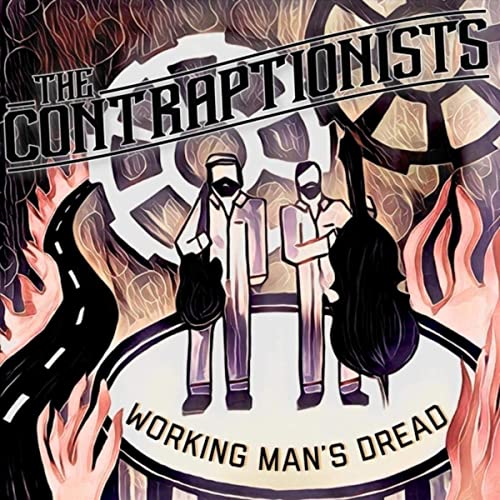Artist: The Contraptionists
Album: Working Man’s Dread
Label: Self-released
Release Date: 5.28.21

Reaching the end of The Contraptionists’ debut album Working Man’s Dread, Paul Givant is ready to kiss the ground in the yearning closer “Dream Song.” A sighing sweep of earnest folk-pop that takes a hit off John Denver’s “Rocky Mountain High,” with Givant exhaling, “Good morning, California/God, I’ve missed you,” it expresses the exhaustion and relief of a tired touring musician arriving home after weeks on the road.
And who could blame him or partner Stephen Andrews for feeling utterly spent? They also punch a clock as members of the Americana outfit Rose’s Pawn Shop, with elements of that outfit’s rustic, grassy textures and tempos growing through the cracks of Working Man’s Dread like weeds. Moonlighting as a duo, they now run the gnarly, rough-and-tumble folk-rock machinery of The Contraptionists, too, without much of a break, both busily beating out percussion via their feet, as singer-songwriter Givant plays banjo and guitar, with Andrews toiling away on bass. Little wonder then that they lament the plight of those stuck in low-wage jobs in the jumpy, locomotive title track or die a little inside while the spinning, grungy urgency of their aspirational “Empire of Smoke” crumbles.
If idle hands are, indeed, the devil’s workshop, then The Contraptionists must be in line for sainthood, as they feverishly reel through a lightly melodic, flowing “Past the Speed of Sound,” hitting their stride in a racing outburst of bluegrass revelry. Dark murder ballads are encountered along the way, like the aptly named “Murky Floor,” a dreary, languid nightmare of sociopathic violence, and “Sight of Blood,” with its vaguely Eastern European tones and twirls, but romance is alive and well in the hopeful and tender country-pop love letter “Flotation Device.” Hearts, however, are broken in the bruised and bittersweet “Plead,” which slowly opens up such achingly beautiful wounds that the pain feels like a gift.
Memories of such injuries would be gently erased in “River Lethe,” which dips its toes in a whirlpool of ‘60s pop and psychedelic-rock and references a river in Greek mythology that causes amnesia. Forgetting the intelligently crafted narratives, the strong hooks caught up in an inventive mix of rural and industrial aesthetics and the currents of tight, spirited musicianship of Working Man’s Dread won’t be so easy.
—Peter Lindblad







Be the first to comment!